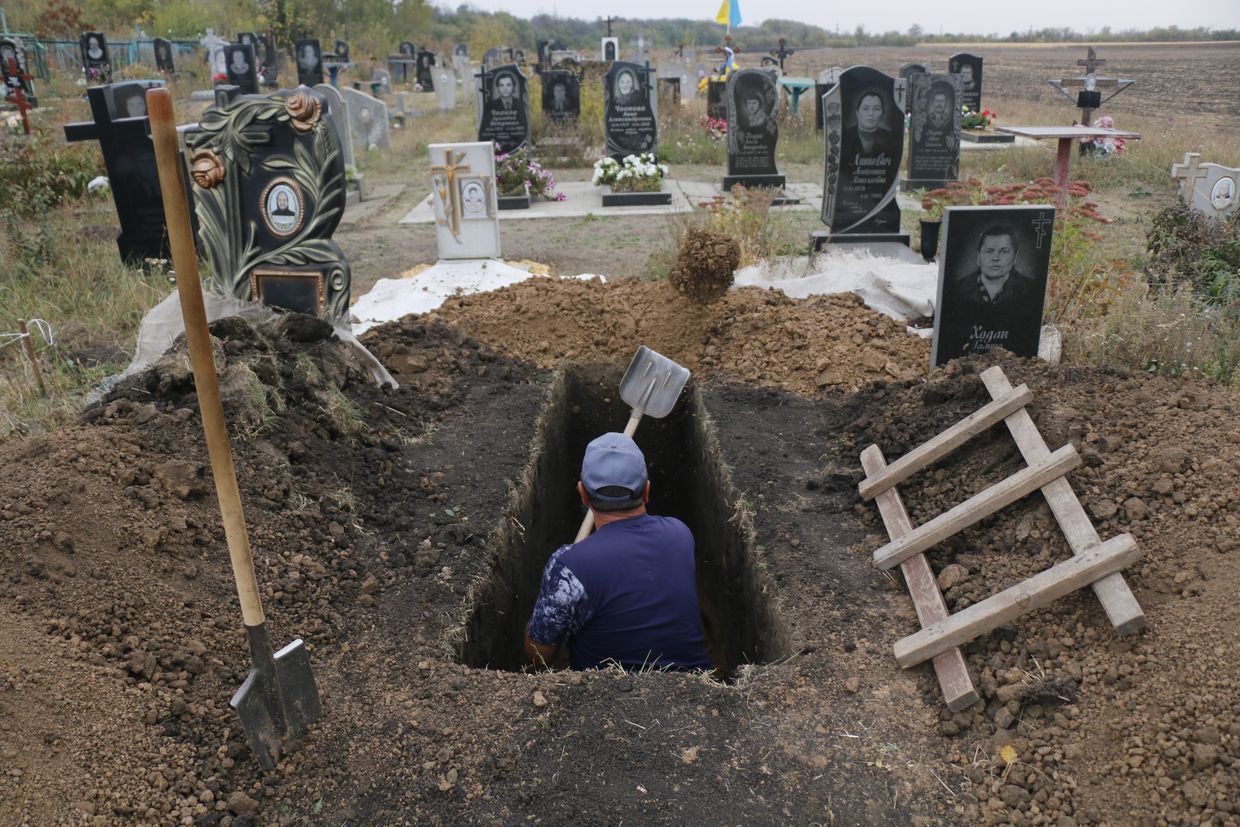Dozens left without a home as Russian strike damages apartment building in Kyiv
KYIV – Alina, her 9-year-old son, and 80-year-old grandmother were sitting outside. Their apartment was burned down, window frames were blown out, and the three were cut by shattered glass.
“We were lucky (to survive). A fire quickly broke out, smoke around. The child was half naked. I managed to grab what I could and rush outside,” Alina, who declined to provide her last name, told the Kyiv Independent.
Russia hit Kyiv with 10 ballistic missiles and 10 kamikaze drones at 3 a.m. on Dec. 13. According to the military, air defense shot down all of the missiles and drones, but falling debris still hit buildings around the city.
In total, 53 people were wounded, including children. Around 20 have been hospitalized.
Before the air raid sirens went off, one of the missile debris landed between a kindergarten and a 9-story apartment building on Kyiv's east bank, catching the residents off guard.
The blast shattered glass in neighboring buildings and caused several fires, destroying apartments and parked cars.
“(Grandmother) was alive but covered in cuts. The child and I were covered in cuts,” said Alina, who lives with her family on the sixth floor.
According to Alina, they ran over the glass barefoot to escape the apartment that caught fire.
“The apartment is all destroyed. The walls are intact, everything else is destroyed and burned. We have nothing left,” Alina said with chapped lips marked with soot about her apartment.
Impact site
The police, armed with Kalashnikov rifles, cordoned off the building located in the Kyiv neighborhood of Voskresenka, named after the Church of the Resurrection.
Clothing and bedding were scattered on the ground and hanging on nearby trees.
First responders thoroughly went through the mutilated facade of a residential building, throwing down what just hours ago were windows and balconies.
Bulldozers move the burned and shattered cars parked nearby to clean the access to the building for the State Emergency Service.
The big crater, deep enough to fit a car in, is next to the second entrance to the building. Police told the Kyiv Independent on the site that preliminary data shows it was a ballistic missile.
The blast was powerful enough to catapult one of the cars into the kindergarten several meters away.
One of the damaged cars belongs to Yevhen, who also lives on the sixth floor with his wife, father, and a cat.
“When we left the room (we were sleeping in), we realized there were no doors and windows,” Yevhen told the Kyiv Independent as his wife was gathering pieces of what used to be their car.
The residents of the damaged building were promptly evacuated at night, Kyiv Mayor Vitalii Klitschko reported on the morning of Dec. 13.
“The city authorities will provide temporary housing for the affected residents during the recovery period,” Klitschko said in a Telegram post.
However, Yevhen said the local authorities haven't provided the residents with any information on what to do next.
“We'll look for someplace (to live),” Yevhen said before the police allowed him to get inside the building to pick up stuff not damaged by the blast.
Aid stations
Not far from the building, people have gathered near several tents bearing the logos of UNHCR and Ukraine's Red Cross. Many of them are wrapped in warm gray blankets, holding cups of warm tea.
The volunteers of the Right to Protection charity talk to those affected by the Russian attack.
“We are tasked to help people, to inform them of what they are (supposed) to do to document the damages, injuries. We also help with information on legal assistance and registration for financial aid from the UNHCR,” one of the volunteers, who was not authorized to speak to the media, told the Kyiv Independent.
They said they helped dozens of people with the legal information and compensation details.
Iryna, an elderly resident of the damaged building, was among those who managed to apply for the aid as several of her windows were shattered.
Those who required medical assistance, warm clothes, or food could turn to the Red Cross tent set nearby.
Tetiana Hoienko heads the Ukrainian Red Cross' Kyiv branch and said the rapid response team arrived at the scene along with the State Emergency Service straight after the explosion.
“Over 500 people have sought help to warm up,” she told the Kyiv Independent, adding her team will provide locals with plastic foil to cover the broken windows.
Larysa Turovets, the head of the nearby damaged kindergarten, was among those present at the site.
“It would be a tragedy if it happened during the day when around 120 children are here,” she told the Kyiv Independent.
Massive attacks
Starting from October, as cold weather was approaching, Ukrainian officials and military have warned Ukrainians that Russia would attempt to repeat large-scale attacks against the energy infrastructure aimed at plunging Ukrainian cities and villages into darkness.
“We all must be aware that Russia has not abandoned this tactic of terror,” President Volodymyr Zelensky said in his Dec. 12 video address, just hours before Russian missiles hit Kyiv.
Between October 2022 and February 2023, Russian forces attempted to cripple Ukraine's energy network with massive strikes leading to power outages and a lack of heating across the country.
Although Ukraine has bolstered its air defense capabilities with the Western systems, Russian forces continued massive air attacks.
Ukraine’s partners pledged to deliver more air defense systems to Ukraine as Russian attacks became more frequent.
Following the Dec. 13 massive attack, Zelensky said that Russia “confirmed its shameful title as a country that launches missiles at night, targeting residential neighborhoods, kindergartens, and energy facilities in winter.”
“There will be a response to all of this. Definitely!” said the president.











